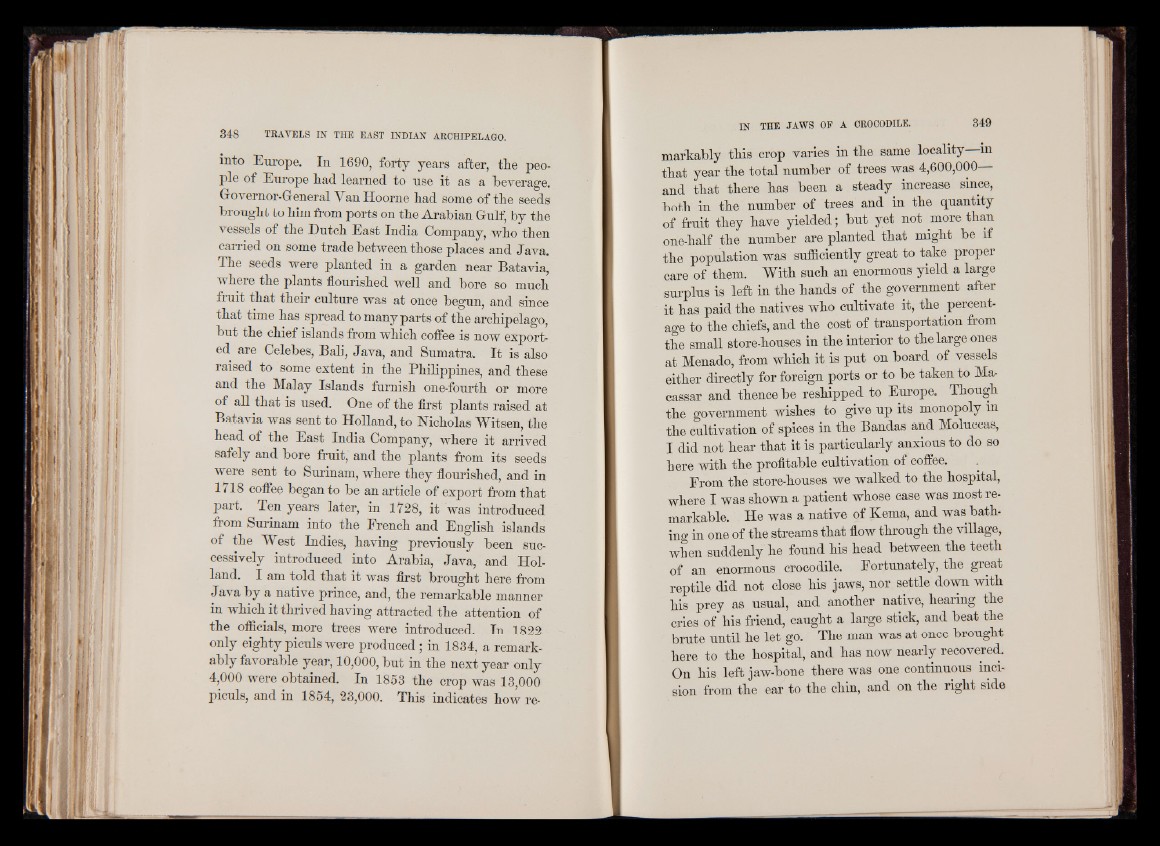
into Europe. In 1690, forty years after, the people
of Europe had learned to use it as a beverage.
Governor-General Van Hoorne had some of the seeds
brought to him from ports on the Arabian Gulf, by the
vessels of the Dutch East India Company, who then
carried on some trade between those places and Java.
The seeds were planted in a garden near Batavia,
where the plants flourished well and bore so much
fruit that their culture was at once begun, and since
that time has spread to many parts of the archipelago,
but the chief islands from which coffee is now exported
are Celebes, Bab, Java, and Sumatra. It is also
raised to some extent in the Philippines, and these
and the Malay Islands furnish one-fourth or more
of all that is used. One of the first plants raised at
Batavia was sent to Holland, to Nicholas W itsen, the
head of the East India Company, where it arrived
safely and bore fruit, and the plants from its seeds
were sent to Surinam, where they flourished, and in
1718 coffee began to be an article of export from that
part. Ten years later, in 1728, it was introduced
from Surinam into the French and English islands
of the West Indies, having previously been successively
introduced into Arabia, Java, and Holland.
I am told that it was first brought here from
Java by a native prince, and, the remarkable manner
in which it thrived having attracted the attention of
the officials, more trees were introduced. In 1822
only eighty piculs were produced ; in 1834, a remarkably
favorable year, 10,000, but in the next year only
4,000 were obtained. In 1853 the crop was 13,000
piculs, and in 1854, 23,000. This indicates how remarkably
this crop varies in the same locality—in
that year the total number of trees was 4,600,000—
and that there has been a steady^ increase since,
both in the number of trees and in the quantity
of fruit they have yielded; but yet not more than
one-half the number are planted that might be if
the population was sufficiently great to take proper
care of them. With such an enormous yield a large
surplus is left in the hands of the government after
it has paid the natives who cultivate it, the percentage
to the chiefs, and the cost of transportation from
the small store-houses in the interior to the large ones
at Menado, from which it is put on board of vessels
either directly for foreign ports or to be taken to Macassar
and thence be reshipped to Europe. Though
the government wishes to give up its monopoly in
the cultivation of spices in the Bandas and Moluccas,
I did not hear that it is particularly anxious to do so
here with the profitable cultivation of coffee.
From the store-houses we walked to the hospital,
where I was shown a patient whose case was most remarkable.
He was a native of Kema, and was bathing
in one of the streams that flow through the village,
when suddenly he found his head between the teeth
of an enormous crocodile. Fortunately, the great
reptile did not close his jaws, nor settle down with
his prey as usual, and another native, hearing the
cries of his friend, caught a large stick, and beat the
brute until he let go. The man was at once brought
here to the hospital, and has now nearly recovered.
On his left jaw-bone there was one continuous incision
from the ear to the chin, and on the right side